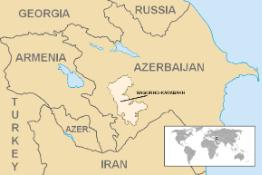On March 4, Azerbaijan's breakaway enclave of Nagorno-Karabakh became a scene of one of the most controversial attacks there since a May 1994 ceasefire, which established a no war, no peace situation in the region. The conflict started in 1988, when the predominantly Armenian population of Nagorno-Karabakh stated its intention to secede from Azerbaijan. The resulting war caused severe casualties and massive population displacement on both sides. Azerbaijan lost control over the majority of Nagorno-Karabakh's territory and the adjacent seven regions. Although the Nagorno-Karabakh republic currently enjoys de-facto independence, no country has recognized it as an independent entity. Despite decade-long efforts to resolve the conflict, Azerbaijan and Armenia have so far failed to agree on essential points. Since 1992, bilateral negotiations have been brokered by the so-called Minsk Group of the Organization for Security and Cooperation in Europe (OSCE). The Minsk Group is co-chaired by Russia, the United States, and France.
Nagorno-Karabakh Incident Heightens Armenia-Azerbaijan Tensions

